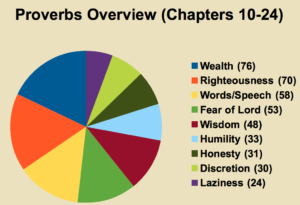Last week I wrote about the first 7 verses of Proverbs 1. We discussed the purpose of the book of Proverbs, and how it’s important for gaining wisdom. We discussed why wisdom and understanding are so important in general. And then why it’s especially true in the case of the young, simple, and inexperienced. We also discussed why it’s so important to understand how to read and decipher the form of a proverb, a parable, or a saying of the wise. We then concluded by discussing what the “fear of the Lord” means and why it’s important for all Christians to think about that concept. From a Christian perspective, we are recipients of God’s Grace and Mercy. We get to spend an eternity with God, and we read that God is Love. But that’s the End of the story, and we can’t understand the end, until we understand the beginning. Yes, God is Love, but that’s just one dimension of His character. We can easily forget other aspects of God’s character. We can forget how dangerous God is to those who practice evil. We can easily forget about God’s justice, His righteousness, His holiness, and His wrath towards His enemies. And that’s who we all were. Enemies of God. A holy and righteous God can not ignore sin. A Just God needs to execute justice. If he doesn’t, He would be like a courtroom who finds someone guilty of murder, but then sentences no punishment. He wouldn’t be Just. These qualities of God make Him very dangerous to people in general, and us in particular. It is appropriate for us to Fear Him. That fear is the beginning of knowledge. There’s righteous wrath involved in God’s character. And He has every right to direct that wrath towards us. But He doesn’t. He directed it towards Jesus. Because He loved his redeemed. He loved his church. That love is the completion of knowledge that began with fear..
Today, I wanted to follow up on those ideas and actually teach one of the topics or themes from the book of proverbs. We won’t be able to read each and every relevant proverb in the book. But before we start with one topic, I want to give you a summary or overview of the major lessons that we can learn from Proverbs. To prepare this information, I read each proverb from all the chapters starting with 10 through chapter 24. For each proverb, I figured out what lesson or theme or topic it dealt with and tagged it. Some proverbs deal with more than one topic, and for those, they got multiple tags. So here are the results:

~76 proverbs deal with the issue of wealth or riches.
~70 deal with the power of righteousness or the pitfalls of it’s opposite, wickedness
~58 deal with the power of words, or the importance of speech and your tongue
~53 discuss the fear of the Lord and/or the Lord’s Sovereignty
~48 discuss the benefits of wisdom and the curse of folly or foolishness
~33 deal with the idea of accepting correction, being humble, or avoiding pride
~31 deal with honesty and a having trustworthy character
~30 deal with discretion, discernment, or prudence
~24 deal with Laziness (and about half of these laziness tags also deal with wealth)
Other popular topics that were tagged include:
- Love vs. Malice
- Patience vs. Haste
- Generosity vs. Miserliness/Stinginess
- Envy vs. Contentment
- Peace vs. Violence
- Discipline/Correction vs. Allowing one to continue in
ignorance - Avoiding Drunkenness and/or Gluttony
- Finding a spouse of Faithfulness / Good Character
I will deal today with the top 1 and we can do some more when I write later.
Topic 1 : Wealth
One of the most common topics dealt with in Proverbs is wealth. When we take a look at what Proverbs has to say about wealth or riches, we learn some interesting things. First let’s talk about where wealth comes from:
Prov. 12:11 Those who work their land will have abundant food, but those who chase fantasies have no sense.
Prov. 14:23 All hard work brings a profit, but mere talk leads only to poverty.
Prov. 18:20 From the fruit of their mouth a person’s stomach is filled; with the harvest of their lips they are satisfied.
Prov. 21:5 The plans of the diligent lead to profit as surely as haste leads to poverty.
So there’s a lot of different explanations for wealth. The first thing to notice is generally it takes hard work.
To gain wealth, you need to do more than just talk. You need to do more than chase fantasies. Talk is cheap, but real wealth accumulation takes planning and diligence.
Prov. 14:23 All hard work brings a profit, but mere talk leads only to poverty.
Prov. 18:20 From the fruit of their mouth a person’s stomach is filled; with the harvest of their lips they are satisfied.
If you compare 14:23 and 18:20, they seem to conflict with each other. Mere talk leads only to poverty. But the fruit of your mouth and the harvest of your lips can fill your stomach. So what’s the explanation there? We know that many people’s livelihoods are based on their ability to communicate. The third most repeated lesson topic in Proverbs is the power of your speech, the words you use to express yourself, or your tongue. Throughout the book of Proverbs we learn that the ideas that we express with our words are very important. What we say with our words explains what we’re thinking or what we intend to do. As it relates to wealth, Speaking, making agreements, and delivering what we promise build credibility. So it’s important to speak honestly and truthfully. The things that we choose to say matter. However, going back to Prov. 14:23, if all you bring to the table is “mere talk” then you are left poor. You need to act in accordance with your speech, or else you’re just dismissed as a hypocrite, a windbag, full of hot air, or worse a liar. The scary thing is, it IS possible to make a fortune by speaking lies:
Prov. 21:6 A fortune made by a lying tongue is a fleeting vapor and a deadly snare.
Prov. 13:11 Dishonest money dwindles away, but whoever gathers money little by little makes it grow.
Honesty in our speech is Biblical, but there are liars out there, and those people make money. Sometimes they make a fortune off of their lies. However, that fortune is fleeting like a vapor, and because of the character of the person with the money, it could be deadly like a snare or a trap. Money gained dishonestly tends to dwindle or go away quickly. Why? When you gain money slowly and through hard work and honestly, you appreciate it differently, and you make it last.
Honesty is important, but beyond honesty, there also needs to be a certain amount of effort or substance beyond just the words, or else you’d lose credibility. There’s a difference between just having an idea, and putting through the effort to make it actually happen. To do things well it takes preparation and planning.
Prov. 20:13 Do not love sleep or you will grow poor; stay awake and you will have food to spare.
Prov. 12:27 The lazy do not roast any game, but the diligent feed on the riches of the hunt.
Like Proverbs 20:13 says, You need to stay awake and work hard.
Laziness will prevent us from acquiring wealth. We need to teach these ideas to the youth, and set realistic expectations about what it takes to succeed in this world. It can be disheartening to expect a certain degree of success without actually understanding what kinds of preparation, instruction, and planning go into a successful venture. We need to discourage laziness, but there’s the totally opposite side of the spectrum. Prov. 23:4-5
4 Do not wear yourself out to get rich; do not trust your own cleverness.
5 Cast but a glance at riches, and they are gone, for they will surely sprout wings and fly off to the sky like an eagle.
There are some people who struggle not with laziness, but because they only know hard work. Sometimes that hard work and positive reward cycle can become very enticing. Landing the next big account or getting a raise or promotion can become an idol to the successful person that begins to reap rewards. Generally it takes hard work to gain wealth, but we need to heed the advice here in Proverbs 23:4. we need to make sure we aren’t wearing ourselves out in order to get rich.
This type of trap happens a lot in 21st century America, but as we see here, it’s nothing new People can lose sight of the important things in life, and the pursuit of wealth is not the most important thing. There needs to be a balance. Sometimes people are blessed with wealth without experiencing painful toil.
Prov. 10:22 The blessing of the Lord brings wealth, without painful toil for it.
Some translations say that the Lord Blesses with wealth, but toil does not add to it. Others say the blessing of the Lord makes rich, and he adds no sorrow with it. Different translations have different shades of meaning, but the similarity is that sometimes people are rich, and they don’t toil hard, or worry, or have any sorrows. It’s easy to feel resentful, angry or envious of such a person, but Solomon attributes that to a blessing from the Lord. The Proverbs continually remind us that God is sovereign and He determines our paths. Therefore, the wealth of others is a form of blessing from God and is something that should not be reviled or held with contempt.
Other times people gain wealth from ruthlessness or oppression.
Prov. 11:16 A kindhearted woman gains honor, but ruthless men gain only wealth.
Prov. 22:16 One who oppresses the poor to increase his wealth, and one who gives gifts to the rich—both come to poverty.
The book of Proverbs is interesting. It’s not like the other books of the Bible. What is the way to experience eternal life? There’s only one answer. Believe in Jesus Christ. Whoever believes in Him will not die. We must be born again of Spirit, not flesh. Jesus is the way, the truth the life. Nobody gets to the Father without going through the Son. No matter where you read the question, the answer is the same. But how do you achieve wealth? Solomon’s wisdom says there’s lots of answers to that one. You could be a liar, you could be an oppressor, you could be ruthless. Or you could work hard. You could communicate honestly. You could plan diligently. You could be lucky and inherit it. You could be blessed by God, and not have to experience any painful toil.
There’s not ONE answer, but there are many general tendencies. There are many typical popular roads that one can take. Some of the ways are morally correct and others are wrong. That’s the importance of discernment. When we study the character of God, we know it is better to gain wealth one way versus another. It’s better to work hard, instead of be lazy. It’s better to be honest instead of deceitful. It’s better to be generous than to be stingy. But both happen. The world is a complicated place.
Once you acquire wealth, there are appropriate things to do with it. Many Proverbs about wealth are also about generosity too.
22:9 The generous will themselves be blessed, for they share their food with the poor.
11:24 One person gives freely, yet gains even more; another withholds unduly, but comes to poverty.
11:25 A generous person will prosper; whoever refreshes others will be refreshed.
Proverbs warns that while it’s good to share with others, there are some things that you can do in the name of generosity which tend to backfire.
11:15 Whoever puts up security for a stranger will surely suffer, but whoever refuses to shake hands in pledge is safe.
22:26 Do not be one who shakes hands in pledge or puts up security for debts;
Putting up security for others’ debts is repeatedly warned against. The modern day equivalent would be co-signing a loan or taking on somebody else’s obligations, or debts.
Another trap associated with wealth is the pursuit of pleasure or luxury.
21:17 Whoever loves pleasure will become poor; whoever loves wine and olive oil will never be rich.
21:20 The wise store up choice food and olive oil, but fools gulp theirs down.
Having expensive tastes means you drain your wealth much quicker in general. Or you spend more of your life working to sustain your habits. That time that you spend working hard is time taken away from other things like family, church, study, or growth. Living within your means is a lesson which can benefit so many people, not just low income people but high income people too. I’ve read a lot of stories about 6 or 7 figure income earners who are living paycheck to paycheck. It’s important and Biblical to budget and think about your expenses. It’s a simple mathematical calculation, but it just doesn’t get done as much as it should. This can be an area that people keep out of their spiritual life, but we should try and make an effort to make God the lord of our finances as well as other areas of our lives. So what’s the point of all this?
Prov. 10:15 The wealth of the rich is their fortified city, but poverty is the ruin of the poor.
Prov. 18:11 The wealth of the rich is their fortified city; they imagine it a wall too high to scale.
Proverbs 10:15 seems to state the obvious. Rich people’s wealth offers protection. Poor people’s poverty ruins them. No kidding. Isn’t that just saying one thing equals another? If you’re rich you have wealth, and being poor is just the definition of poverty. But I think it’s saying more than just that. “The rich” in this case isn’t just anyone who is wealthy. “The rich” seem to define themselves by their possessions. Their safety, their protection, their storehouse their fortified city is the wealth they have. It’s almost like this group of people called “the rich” are the group of people who’s decided to trust in this fortified city known as their wealth. “The poor” here are also aren’t just anyone who doesn’t have much money. “The Poor” is this group of people who have allowed for themselves to be ruined by their poverty or their circumstances. There are plenty of ways to come to ruin, and in this case I think both groups “the poor” and “the rich” are endangered in this proverb here. Solomon begins Proverbs 18:11 the same way as 10:15. But the ending gives away the truth. “the rich” are back with their fortified city of wealth. But what about this “fortified city?” it’s imagined. “The Rich” ? they’re living in this fantasy world where they think they’re invincible.They think their wealth is a huge wall to protect them. It might just be a big target on their backs. Wealth can be helpful, it is good, but it’s not everything.
11:4 Wealth is worthless in the day of wrath, but righteousness delivers from death.

11:28 Those who trust in their riches will fall, but the righteous will thrive like a green leaf.
What is greater than wealth? A lot of things. But sadly enough, those who trust in their riches might miss the bigger picture. They might not see the truth, because they’re putting their trust in the wrong things. What delivers us from death? Righteousness. What helps us thrive? Righteousness. We need to put our trust not in wealth, but in Righteousness. Righteousness versus wickedness is the next most popular topic of proverbs. That concept and topic deserve their own sermon, so I won’t pretend to go over everything that needs to be said today. But it is important to know that righteous behavior is better than wealth. Righteousness is what we want to strive for. Righteousness means avoiding sin. Turning away or repenting from wickedness. We can act righteous, but we cannot BE completely righteous in this lifetime. Sin leads to death. Righteousness delivers from death. We can be saved entirely by righteousness, but we can’t attain full righteousness ourselves, we need to be given righteousness. That’s where the Son comes in. Jesus takes our wickedness upon himself and His righteousness is imputed onto us. God made a provision for us to become his righteous people, not by our righteous acts, but by the Righteous acts and the Righteous being of Jesus. Our true wealth is not in riches we accumulate here on this planet. Our true wealth is in our being made righteous in Jesus Christ. The Bible tells us that we shouldn’t hoard treasures on earth, but treasures in Heaven. I am not sure what types of treasures are in heaven, but I do know the most important treasure is to share an eternity with God and savor and enjoy being in his presence. Fellowship with God is the greatest treasure that I can imagine. Let us pray, thanking God for this fellowship he’s given us, and pray that we can share this fellowship with those that don’t know it. Let’s pray for the Bride of Jesus, his Church to grow in this.




